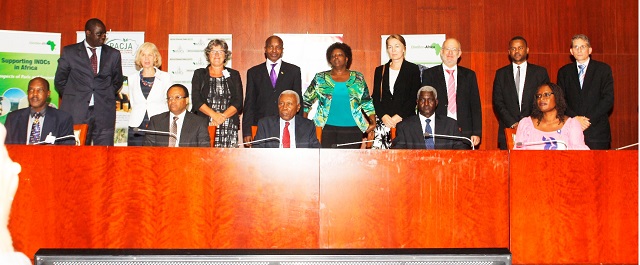The Africa Climate Talks (ACT!) underscore the importance of speaking with “one voice”
Addis Ababa, 20 September 2015 (ClimDev-Africa) – The first of the series of discussions on the implications, governance, solutions and opportunities of climate change in Africa, dubbed the Africa Climate Talks (ACT!) was held in Dar es Salaam, Tanzania from 3-5 September, under the theme, 'Democratizing Global Climate Change Governance and Building an African Consensus toward COP 21 and Beyond”.
The forum was hosted by the University of Dar es Salaam and the Economic Commission for Africa (UNECA) Africa Climate Policy Centre (ACPC) as part of the ACPC’s ongoing efforts to dynamize Africa’s preparations for the United Nations Framework Convention on Climate Change (UNFCCC) Conference of Parties (COP21).
The Vice President of the Republic of Tanzania, H.E. Dr. Mohammed Gharib Bilal who officially opened the event welcomed the initiative saying “This conference is a clear signal that Africa is ready to shift from being just a mere spectator at COP meetings to a key player. This comes after the realization that the Kyoto Protocol has not benefited Africa as the other regions because of poor preparation before the negotiations.”
Attended by over 300 people from a cross- section of stakeholders including representation from, the youth, academia, international organizations, Non Governmental Organizations and civil society, participants emphasized that Africa has an important role to play and must take its place in countering global warming. To achieve this adaptation and mitigation must be mainstreamed in African policy processes.
So far, in response to changing climatic conditions, African countries have proactively put in place climate change policies with tools geared towards mitigating and adapting to their impacts. Some have invested heavily in clean energy, some have adopted climate-smart farming techniques, and others have invested in tree growing.
Noting that the stakes for the continent are high in the upcoming negotiation for a new global climate change agreement to replace the Kyoto Protocol, it was emphasized that despite the continent’s diversity, Africa must speak with one voice that takes its (Africa’s) development priorities into account and thus avoid the divisive tactics that have weakened the African position in past negotiations.
“We need to change and change has to start from within,” said Vice President Bilal, “The vision has to be crafted from within and we have to go to Paris to champion a narrative and cause that is consistent with our own development aspirations.”
Another speaker, Dr. Oliver Ruppel a University of Stellenbosch Professor of Law, said the UNFCCC, as a legal instrument, is a court case at which Africa must have a clear and compelling argument.
While climate change will impose significant and unequivocal challenges for Africa’s development, there is evidence of solutions and innovations at the levels at which the impacts are experienced the most. The Solutions Forum, a space within the Africa Climate Talks for success stories that demonstrate local innovation, highlighted a number of community generated initiatives that illustrate that climate change is not only a challenge but an opportunity.
The role of women as the “backbone” to Africa’s development and youth arose repeatedly in the discussions. “We need to focus on Africa’s journey to prosperity where the voices of women, youth and civil society must guide this journey,” said one speaker.
The discussions underscored the critical need to maintain the founding principles of the UNFCC such as; the precautionary principle, common but differentiated responsibilities and the polluter pays principle.
Other issues including the role of research, the co-creation of knowledge, and the need for convergence between science and policy and the all-important means of implementation were discussed as key to tackling the challenges and opportunities ahead.
It was noted that post Kyoto must not become a market mechanism with other countries designing technology solutions for Africa and that technology must take into account the impact on labour.
In summing up the key messages that emerged from the discussion Dr. Yemi Katerere,WWF Regional Director for East and Southern Africa, underscored that, “We (Africa) are not at the negotiations with a begging bowl, we need to engage confidence and a self-belief that is based upon on our strengths”. He said that patriarachal paradigm of the prevailing climate change discourse must be examined to ensure that we don’t reproduce the the existing systems of dominance, exclusion and marginalization, particularly of women.
The Africa Climate Talks will continue to engage African stakeholders on the implications of the negotiations post-Paris.
- Log in to post comments



